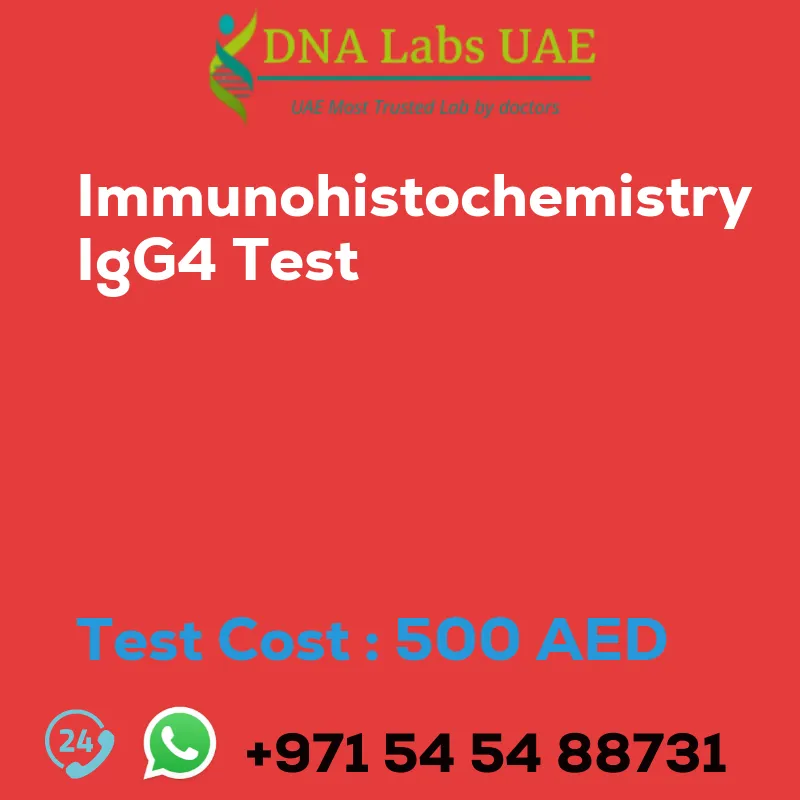IMMUNOHISTOCHEMISTRY IgG4 Test
Welcome to DNA Labs UAE, where we offer the IMMUNOHISTOCHEMISTRY IgG4 Test. This laboratory test is used to detect and measure the levels of IgG4 antibodies in a tissue sample. IgG4 is a subtype of immunoglobulin G (IgG) antibodies that is involved in allergic reactions and autoimmune diseases.
Test Details
The IMMUNOHISTOCHEMISTRY IgG4 test is typically performed on a tissue sample obtained through a biopsy or surgery. The sample is then processed and stained with specific antibodies that bind to IgG4. If IgG4 antibodies are present in the tissue, they will bind to the antibodies in the test, resulting in a visible color change or fluorescence under a microscope.
The test is primarily used to diagnose and differentiate IgG4-related diseases, such as IgG4-related autoimmune pancreatitis, IgG4-related sclerosing cholangitis, and IgG4-related kidney disease. These conditions are characterized by the infiltration of IgG4-positive plasma cells in affected tissues.
Test Components and Price
The cost of the IMMUNOHISTOCHEMISTRY IgG4 Test is AED 500.0.
Sample Condition and Submission
To perform the test, please submit tumor tissue in 10% Formal-saline or Formalin fixed paraffin embedded block. The sample should be shipped at room temperature. Additionally, provide a copy of the Histopathology report, site of biopsy, and clinical history.
Report Delivery
The report for the IMMUNOHISTOCHEMISTRY IgG4 Test will be delivered daily by 6 pm for samples, 5 days for report blocks, 5 days for tissue biopsies, and 7 days for tissue large complexes.
Method and Test Type
The IMMUNOHISTOCHEMISTRY IgG4 Test is performed using immunohistochemistry, a method that involves staining the tissue sample with specific antibodies. The test falls under the category of surgical pathology.
Doctor and Test Department
The IMMUNOHISTOCHEMISTRY IgG4 Test is conducted by a physician or pathologist in the HISTOLOGY department.
Pre Test Information
Prior to the test, it is important to provide a copy of the Histopathology report, site of biopsy, and clinical history.
Interpretation and Diagnosis
Interpretation of the IMMUNOHISTOCHEMISTRY IgG4 Test results requires expertise and knowledge of the specific disease being investigated. A higher number of IgG4-positive plasma cells in the tissue sample may suggest the presence of an IgG4-related disease. However, the test alone is not sufficient for diagnosis, and clinical correlation with other signs and symptoms is necessary.
The IMMUNOHISTOCHEMISTRY IgG4 Test is a valuable tool in the diagnosis and management of IgG4-related diseases. It helps guide appropriate treatment decisions.
| Test Name | IMMUNOHISTOCHEMISTRY IgG4 Test |
|---|---|
| Components | |
| Price | 500.0 AED |
| Sample Condition | Submit tumor tissue in 10% Formal-saline OR Formalin fixed paraffin embedded block. Ship at room temperature. Provide a copy of the Histopathology report, Site of biopsy and Clinical history. |
| Report Delivery | Sample Daily by 6 pm; Report Block: 5 days Tissue Biopsy: 5 days Tissue large complex : 7 days |
| Method | Immunohistochemistry |
| Test type | Surgical Pathology |
| Doctor | Physician, Pathologist |
| Test Department: | HISTOLOGY |
| Pre Test Information | Provide a copy of the Histopathology report, Site of biopsy and Clinical history. |
| Test Details |
Immunohistochemistry IgG4 test is a laboratory test used to detect and measure the levels of IgG4 antibodies in a tissue sample. IgG4 is a subtype of immunoglobulin G (IgG) antibodies that is involved in allergic reactions and autoimmune diseases. The test is typically performed on a tissue sample obtained through a biopsy or surgery. The sample is then processed and stained with specific antibodies that bind to IgG4. If IgG4 antibodies are present in the tissue, they will bind to the antibodies in the test, resulting in a visible color change or fluorescence under a microscope. The immunohistochemistry IgG4 test is primarily used to diagnose and differentiate IgG4-related diseases, such as IgG4-related autoimmune pancreatitis, IgG4-related sclerosing cholangitis, and IgG4-related kidney disease. These conditions are characterized by the infiltration of IgG4-positive plasma cells in affected tissues. Interpretation of the test results requires expertise and knowledge of the specific disease being investigated. A higher number of IgG4-positive plasma cells in the tissue sample may suggest the presence of an IgG4-related disease. However, the test alone is not sufficient for diagnosis, and clinical correlation with other signs and symptoms is necessary. Overall, the immunohistochemistry IgG4 test is a valuable tool in the diagnosis and management of IgG4-related diseases, helping to guide appropriate treatment decisions. |







